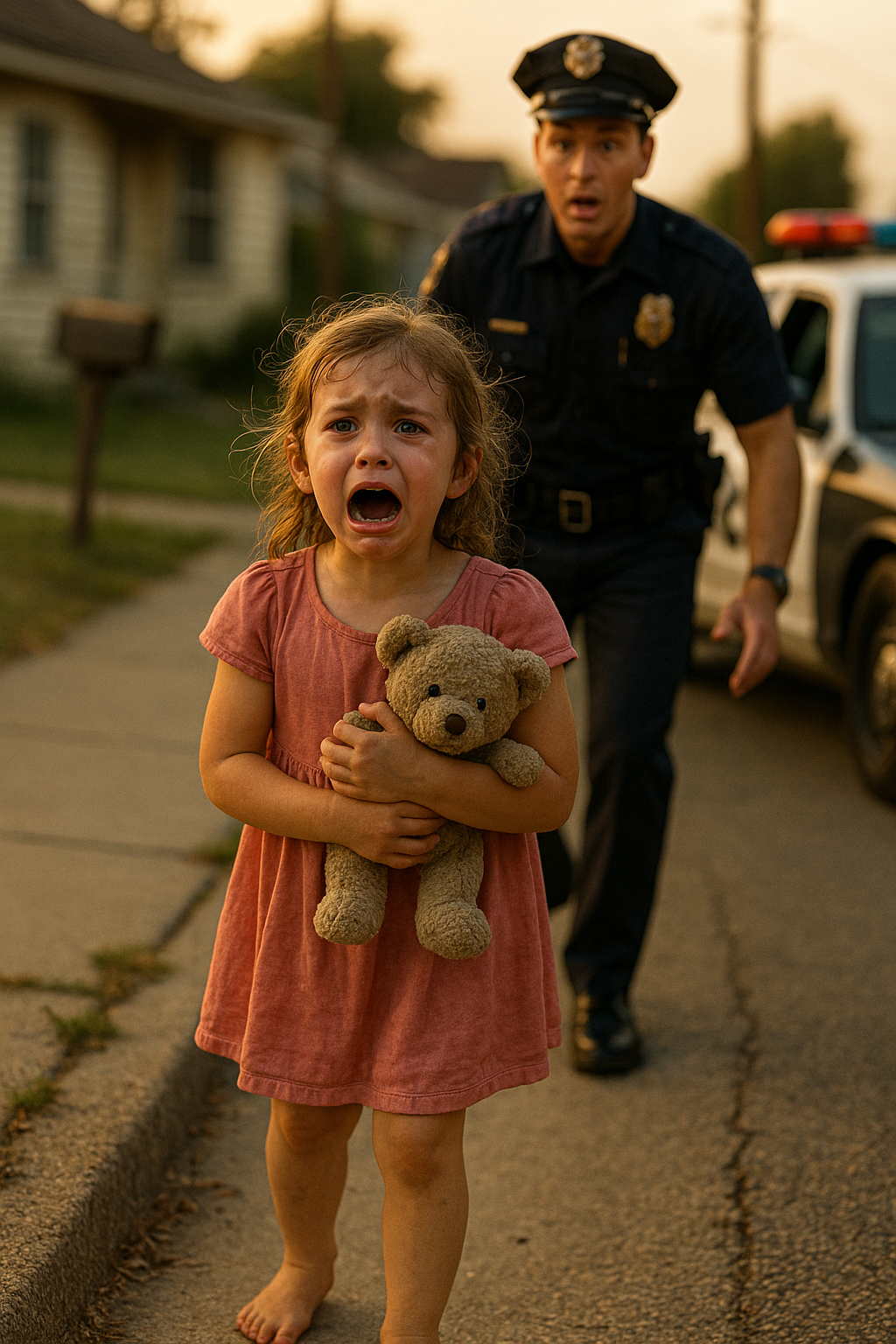A Barefoot Little Girl Burst Into the Street and Flagged Down Police: “Please Follow Me Home” — Moments Later, They Uncovered a Truth No One Expected

The sun was sinking, spilling warm gold across a quiet suburban street, when Officer Ryan Matthews began wrapping up what had been a slow, uneventful shift. The hum of his patrol car and the gentle sway of the trees made the world feel still for a moment.
Until a desperate cry broke through the air.
He turned his head sharply—and there she was.
A tiny girl, no more than six, running barefoot down the pavement.
Her pink dress clung to her small frame, her cheeks streaked with tears. One hand clutched a worn teddy bear; the other kept swiping at her face, as if she could wipe the fear away.
She stopped in front of his cruiser, gasping for breath.
“P-please… please come quick… my mommy—she won’t wake up!”
Ryan was out of the car in seconds, kneeling so they were eye to eye.
“What’s your name, sweetheart?”
“L-Lila,” she whispered between sobs.
“I’m Officer Ryan. You’re safe now. Can you show me your house?”
She nodded, tugging urgently at his hand. “Hurry, please!”
No hesitation—he followed her. She darted through side streets, her little legs moving fast despite her ragged breaths.
When they reached the house, his instincts tightened.
The lawn was overgrown, the mailbox leaned to one side, and the front door was ajar.
Lila pointed with trembling fingers. “She’s inside… she won’t move.”
Ryan stepped in carefully. The air was stale. The living room was cluttered—stacks of unopened mail, empty food containers, and the soft buzz of an unwatched TV.
“Mommy?” Lila’s voice was small as she followed him into a dim bedroom.
On the bed lay a young woman—still, pale, but breathing. Barely.
Ryan rushed to her side, checking for a pulse.
Weak. Her forehead was burning hot. His training told him the truth: severe exhaustion, dehydration, and likely something worse.
He grabbed his radio. “Dispatch, ambulance to 721 Heather Lane. Female, early 30s. Unconscious but breathing. Critical.”
Turning back, he met Lila’s wide, tearful eyes.
“You were so brave coming to get me,” he told her gently.
“She’s been sick,” Lila cried. “She wouldn’t eat. She just said she needed sleep. I tried to make soup, but I couldn’t reach the stove… Then she stopped talking… I was scared.”
Ryan’s chest ached. This little girl had been holding her home together, all on her own.
He stayed beside her until paramedics arrived, never letting go of her hand. As they carried her mother—Sarah—out on a stretcher, Lila gripped his uniform like a lifeline.
“I’m coming too,” she said softly.
And so he took her—driving her to the hospital, sitting with her in the harsh fluorescent light of the waiting room, buying her a juice box, wrapping his jacket around her when she shivered.
Hours later, a doctor appeared. “She’s stable. Dehydration, untreated pneumonia, and extreme exhaustion. She’s lucky someone acted quickly.”
Lila’s voice was small. “Is she going to be okay?”
Ryan smiled gently. “She will.”
But he couldn’t shake the image of that cluttered house and the stack of unpaid bills. This wasn’t just one bad day—it was years of quiet struggle.
Over the next few days, Ryan became a constant at the hospital.
He brought Lila coloring books, taught her to fold paper airplanes, and made sure she never felt alone.
When Sarah was finally able to speak, she whispered, “I don’t know how to thank you. I don’t even remember passing out—just pain, then nothing.”
“Your daughter saved you,” Ryan said. “She’s braver than most adults I know.”
Sarah’s eyes dropped. “I’ve been trying so hard. Nights cleaning offices, mornings at a café. Two hours of sleep. Rent, food, bills—it never stops. I didn’t want to ask for help.”
“You don’t have to do it alone anymore,” he told her. “Let us help.”
The next day, he made calls—to charities, to fellow officers, to local businesses. Within days, groceries, gift cards, and clothing began to pour in. A handyman fixed up the house. Neighbors mowed the lawn. Ryan himself cleaned, painted, and repaired until the home felt alive again.
When Sarah came home two weeks later, she found a fridge stocked with food, freshly made beds, and a front door that no longer creaked—Ryan standing on the porch with Lila’s hand in his.
“I… I don’t know what to say,” she whispered, tears in her eyes.
“You don’t need to say anything,” he smiled.
Lila ran to her, wrapping her arms around her waist.
From then on, life shifted. A local charity found Sarah a part-time job with good hours and benefits. No more nights away. She and Lila could finally eat dinner together. Ryan kept visiting—sometimes with groceries, sometimes just to check in, often to take Lila to the park.
Before long, the neighbors noticed—the officer who once patrolled alone now often walked with a little girl on his shoulders and her smiling mother beside him.
One evening, with fireflies glowing in the yard, Sarah stood next to Ryan watching Lila run barefoot in the grass.
“She’s happier now,” Sarah said softly.
“She’s not the only one,” he replied.
“Why did you do all this?” she asked.
He paused, his voice low. “Because no one should fight alone. Because Lila believed someone would come when she called for help. And because… that night, she didn’t just find a police officer—she found family.”
Sarah’s eyes filled, but this time it was with gratitude, not fear.
Lila came running back, breathless. “Can we always stay like this?”
Ryan knelt down. “As long as you want, kiddo.”
She hugged them both, holding on tight. Under the glow of the setting sun, it wasn’t just a hug.
It was a promise.